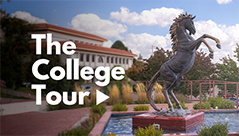Western New Mexico University alumnus Caleb Adams received his bachelor’s in computational mathematics from WNMU, landed an internship at Los Alamos National Labs, and now is entering a fellowship for a Ph.D. in geosciences. “I’ll be working on developing and using computational and mathematical tools in earth systems sciences,” he said.
Five years ago, the South Dakota native was working as a janitor at Taos Ski Valley. “I saw a flyer for the natural resources program through UNM-Taos. My original plan was to get a degree in wildlife biology and natural resource management. But when I was going to school, I just really enjoyed my math classes,” he said.
Since UNM-Taos only offers as far as an associate degree in math, Caleb’s department chair brought up the articulation agreement with WNMU. “The fact that I’d be able to finish that degree online was a big deciding factor. I wouldn’t have to worry about moving my wife with me to another town or commuting.”
At WNMU, he gained exposure to multiple different programming languages and how to use those programming languages to solve math problems.
Through the New Mexico Alliance for Minority participation, he conducted a research project into the world’s carbon footprint with the Dr. Nancy Livingston of the WNMU Math and Computer Science Department. That gave him experience using the R programming language, which is commonly used in statistics. “I loaded data into R Studio and ran a bunch of analysis on it to determine, based on the trajectory of the global carbon footprint, whether sustainability is possible,” he said.
And last summer, Caleb secured an internship at Los Alamos National Laboratory with the computational earth science group. “WNMU gave me the computational and mathematical background to really launch off. I really feel like I have so much more to learn, but without the math and computer science classes at WNMU, I wouldn’t have that background to even get my foot in the door at Los Alamos,” he said.
This summer, Caleb is heading for his Ph.D. program in Austin, where he is getting tuition paid for through a U.S. Department of Energy computational science graduate fellowship. “Their goal is to make sure scientists are getting trained not only in their field but also in applied mathematics and computer science. I’ll be taking not just the geo science courses but also applied math and computer science. It really tacks in all my interests,” he said.
His academic department’s Dr. Tom Gruszka and Dr. Livingston were key in helping Caleb toward his goals, supporting his internship and graduate school applications with letters of recommendation and ensuring he took the necessary courses. “I’m really grateful that I was able to do it all online,” he said. “In another sense, I missed some of the college experience. I have a wife, and we just had a baby. I have a whole other life experience.”
Caleb began college one month before turning 27. “Up to that point, I spent about a decade just doing construction or seasonal work, bouncing around the country. I always thought I’d end up being a concrete finisher like my stepdad and my biological dad. But once I started going to school, I realized I actually love going to school.”
Long term, Caleb anticipates going into research and continuing the kind of work he has done through his internship.


